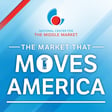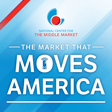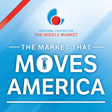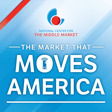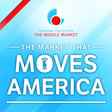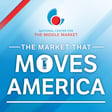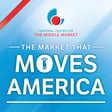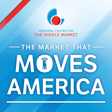Introduction to The Market That Moves America Podcast
00:00:04
Speaker
Welcome to The Market That Moves America, a podcast from the National Center for the Middle Market. The center is the leading source of knowledge, leadership and innovative research on the middle market economy. Throughout our podcast, we will feature middle market leaders and stakeholders to hear their real world perspectives on trends and emerging issues.
Challenges Facing Middle Market Companies
00:00:23
Speaker
In today's macroeconomic environment, there are a number of issues facing middle market companies, ranging from generational transfer of ownership to
00:00:35
Speaker
High interest rates, inflation, and a number of issues around working capital.
Experts Discuss Payment Needs and Trends
00:00:40
Speaker
In today's episode of The Market That Moves America, we'll talk with two experts from Veritex Bank and Visa Commercial Solutions about the payment needs and trends of middle market companies.
00:00:55
Speaker
Welcome to the Market That Moves America. My name is Doug Farin, Managing Director of the National Center for the Middle Market, located at Fisher College of Business at The Ohio State University. Really excited about our episode today. I have the chance to speak with one of our partners, which is Visa, and also one of our NCMM members, which is Veritech. So today's podcast will be a discussion.
00:01:22
Speaker
around the payment space, around fintechs, around what middle market companies in particular are doing to manage their working capital and manage their payment processes. So joining me today is Jay Darnell.
Meet the Guests: Jay Darnell and Lee Radke
00:01:40
Speaker
Jay is the Senior Vice President of Fintech Partnerships at Veritex Community Bank.
00:01:45
Speaker
and Lee Radke, who's Vice President of North America Product at Visa Commercial Solutions. So welcome, Jay and Lee. Thanks, Doug. Great to be here. Yeah, thanks. Thanks, Doug. Really looking forward to today's conversation.
00:02:00
Speaker
So the first thing I'd like you each to do, we'll start with Lee.
Lee Radke's Role at Visa: Money Movement and Payment Solutions
00:02:04
Speaker
Lee, if you could just tell us a little bit about your background and then specifically about your current role with Visa Commercial Solutions, and then we'll have Jay do the same thing with a little bit of background and intro.
00:02:17
Speaker
Sure. I'll set a little context about Visa commercial solutions to kick off. Visa has three key pillars in areas of focus. The first is
00:02:34
Speaker
core payments, which is sort of what everybody thinks about in terms of just having a card in their wallet. The second pillar is what we call value added solutions. It's our consulting and analytics business. It's our fraud tools and controls business.
00:02:53
Speaker
It's business lines that help merchants accept payments along with a variety of other technology capabilities. That's all in value-added services. Then we have our money movement.
00:03:10
Speaker
business. And that's where I sit. That's where Visa commercial solutions sit.
Visa's Growth Strategy Through Payments and Solutions
00:03:15
Speaker
So if you think about money movement, it's it's what it sounds like. It's the movement of funds between consumers and businesses and businesses and businesses of different sizes and businesses and governments. And so within Visa commercial solutions, we deliver products
00:03:36
Speaker
through our banking partners and our FinTech partners into the market that help small businesses, middle market companies, large corporations, governments, and FinTechs to move money through the supply chain and to accept payments and to make payments. And so as the head of North America product, that's what
00:04:03
Speaker
I'm thinking about every day that's the the team of people that I'm lucky enough to lead that's what they're thinking about every single day is how do we put products into the market that will help organizations businesses in particular grow and thrive.
Jay Darnell's Fintech and Banking Expertise
00:04:22
Speaker
Before I was in this role, and Doug, where you and I first met, was when I was heading up our middle market segments. So middle market, as you know, has always been
00:04:34
Speaker
near and dear to my heart. And then prior to Visa, I had several, I worked for a variety of different technology companies, including startups, which we're gonna talk a lot about today. So that's a little bit about my background. Great, thanks. Jay, get a little bit about yourself and your current role.
00:05:01
Speaker
Yeah, sure. Thanks again for the opportunity to chat today. I think it's going to be a really, really fun session. So I joined Veritex Bank almost a year ago to build out and lead the FinTech Enablement business here at Veritex Bank. A little bit about the bank. The bank's headquartered in Dallas, Texas.
00:05:22
Speaker
Just over $12 billion in assets were one of the 10 largest banks that's headquartered in Texas. Really a commercial bank that also has a nice retail presence in the DFW market and in Houston, as well as a digital bank launch that happened last year. But in my capacity here at the bank,
00:05:47
Speaker
We have developed a strong partnership with a leading BaaS provider that allows us to provide banking solutions and services through their platform to end clients.
00:06:01
Speaker
In addition, we're building out our direct enablement business through strategic partnerships with issuer processors to drive digital money movement on payment rails and through the card networks. Prior to joining Veritex, I spent about three years at Visa.
00:06:21
Speaker
North America leadership team for Visa Commercial Solutions where I led the North America B2B FinTech partnerships business. So my team was based throughout the US and Canada and many of the FinTechs that we partnered with there had developed solutions specifically to address the needs of the middle market and small business.
Trends in Ownership Transfer and Digitalization
00:06:44
Speaker
Before Visa, I spent almost seven years at Regent Bank, first leading commercial card sales in the bank's East region, and then moved into a new role at the time for the bank where I led the FinTech partnership business there. In that role, we established net new revenue streams through been sponsorship and partnerships to deliver embedded payments.
00:07:09
Speaker
I kind of feel like I'm stepping back into a similar role here at MeritEx. Prior to regions, I spent just over three years in Washington where I was responsible for public policy and programs for the US Department of Defense. This provided really a different perspective in payments where I was on the side of creating policy and managing programs
00:07:33
Speaker
for the military and civilians that use a card for official travel. So really interesting time there to see payments from a policy perspective. Before that, it was spent almost eight years in Bank of America in various roles. All in the commercial bank, started as a card account manager.
00:07:52
Speaker
managing two of the bank's largest programs there, moved into sales in our global government group, and then moved into more traditional treasury management roles as well. Finally, I actually began my professional career serving on active duty in the United States Marine Corps. I spent almost eight years, just that eight years serving with the Third Marine Regiment and at U.S. Central Command.
00:08:20
Speaker
With that, I can assure you that the young 20-something year old Marine back then would have never guessed he'd spend the rest of his life focused on payments and commercial banking, but it's been a fun ride. Wow, that's quite a journey and thank you for your service, first of all. But yeah, we definitely have two experts here with me today, so I'm excited for this conversation as well.
00:08:46
Speaker
Here at NCMM, you know, obviously we study their performance sentiment challenges of the US middle market. As we think about the ecosystem, I'm going to call it the ecosystem, you both might have your own descriptions, but the ecosystem of fintechs of banks, issuing partners of service providers like Visa. I'm thinking
00:09:14
Speaker
about starting our conversation with what are the top trends that we see. So if we're to describe the state of the middle market as it stands today, that's where I'm curious to explore a little bit here at the start.
Impact of Younger Generations on Business Operations
00:09:27
Speaker
And so, Lee, I'm going to ask you first, given your role, what are some of the things that you're seeing out there as it relates to the specific needs of middle market companies?
00:09:39
Speaker
So middle market, and I'm relaying a lot of what the NCMM's work is, just to be clear, and a lot of the things that we've uncovered together. And so the middle market has historically been
00:10:00
Speaker
underserved, underserved from a variety of factors, underserved from the banking, underserved from a technology perspective. And a lot of the reason why is these are some of the best companies that you've never heard of. It's 220,000
00:10:23
Speaker
companies that for the most part have brands that you've never heard of. There are some middle market companies that are retailers, but for the most part they really sit in the middle of the supply chain. They're manufacturers, they're wholesalers, they're service companies, and these are privately held companies. They're not
00:10:51
Speaker
companies that are publicly traded. They're a little bit under the wire. They're typically 20 to 30 years old. They've been around for a long time. And all of that is important to understand because it sets the stage for the trends that are happening today and why these trends are happening today. So the
00:11:19
Speaker
The first, I'll call it a trend,
Adoption of Digital Payment Solutions
00:11:22
Speaker
is these companies, over 40% of these companies, are about to change ownership. So I mentioned that they've been around for 20 or 30 years. If you just think about that, think about those owners, they're
00:11:39
Speaker
approaching retirement age. And so they need to be thinking about who they're going to leave their company to. And they're going to leave their company, whether they go to a private equity firm or they merge with another,
00:11:57
Speaker
company or they leave their company to a family member or Someone where they sell in any of those cases Chances are that the next owner of that company is going to be either early on in their millennial years or they're gonna be Gen Z and that
00:12:21
Speaker
You know, that generation is not going to do business and they're not going to run those companies the way that they've always been run. And so that brings us to the second trend, which is really digitization or digitalization, which is changing over business systems
00:12:47
Speaker
that are a little bit more automated and help companies run their operations, manage their inventory, move money, make payments, accept payments in ways that are more innovative than they've been in the past. Middle market companies are fairly stuck
00:13:13
Speaker
in the way that they've always operated. I'll provide a payment example. I was talking to a controller recently who had worked for a middle market company for many years, and she was starting to pay some of their suppliers.
00:13:31
Speaker
through digital payment methods. It was ACH. It wasn't even card methods. She was starting to pay her suppliers via ACH. And the company owner insisted that she still write a check, that she still pull out the checkbook and actually write a check and file that check in the filing drawer. And if you can imagine that company changing hands to someone who is
00:14:02
Speaker
28 or 30 years old, that new owner has likely never seen a checkbook in their life. So we can pretty much guarantee that the checks are going to go away. And so that digitalization or digitization trend is
00:14:22
Speaker
on track or happening concurrently with what we see in the broader, you mentioned ecosystem, Doug, like the broader ecosystem, which is the evolution of, it's just, there's more innovation, I'll say it that way, there's more innovation in the payment space than I've ever seen before.
00:14:44
Speaker
So the timing could not be more perfect for fintechs and for banks like Veritex to be bringing the right solutions into the market.
Veritex Bank's Investment in Technology and Innovation
00:15:00
Speaker
Yeah, we're seeing that digitalization approach across a number of different functions, even outside of
00:15:10
Speaker
capital and finance and it relates to pretty much everything from HR management to ERP systems and a number of things. So you use that great example of physical check writing as being kind of an area where a lot of these companies are stuck. And Jay, you might be able to chime in here. I mean, what are some of the when we talk about digital payment needs of mid-sized companies,
00:15:36
Speaker
What are you both seeing as kind of some of the key needs as it relates to making that leap from maybe old processes to newer, more innovative approaches? Yeah.
00:15:49
Speaker
Yeah, let me double click into a little bit of what Lee talked about to sort of set the foundation of my answer to that question. So I actually recently attended a conference that called the Baby Boomer business owner retirement trend a tidal wave. As a matter of fact, the panelists suggested that the Baby Boomer business owners
00:16:13
Speaker
will turn 65 every 57 seconds for the next 11 years. It's a bit mind blowing, right? And so there's a lot of focus on that retirement stat. But the real opportunity does lie with Gen Z and millennials who are going to be planning now to run these great businesses. And they're going to plan to take advantage of this generational shift. So as middle market ownership and leadership becomes younger,
00:16:41
Speaker
We're recognizing and seeing that they're accustomed to convenient digital solutions that they experience in their personal financial life, and they quite frankly expect the same experience in running the business.
00:16:57
Speaker
We've heard the term consumerization of business and that's exactly what we're seeing in terms of trends on how businesses are becoming much more digitally focused, not only on payments, but to your point, across the technology spectrum.
00:17:16
Speaker
Banks, I think like Veritex, we've done a great job in developing banking solutions that are addressing and meeting those needs like digital banking, automated account openings, loan application efficiencies, while still trying to deliver the personal touch that our bankers take pride in while serving our clients. To me, a good example is Veritex stood up a dedicated team of bankers
00:17:41
Speaker
and Treasury professionals and payment experts, international specialty sales group that specifically work with middle market companies in the insurance industry vertical. So this team, it brings more than 75 years of collective experience together to serve our clients across the country.
00:18:02
Speaker
And then to support that practical experience in the middle market insurance banking world, we launched an insights engine tool that systematically monitors and proactively delivers key trends and developments within the industry in near real time.
Visa's Collaboration with Fintechs
00:18:18
Speaker
So I think it's a great example of bringing expert bankers together with innovation to serve our clients.
00:18:26
Speaker
Look, the bank, Veritex Bank does an amazing job in managing risk and serving our clients in a very consultative way. And as the bank continues to invest in new products and solutions to serve our clients in the middle market,
00:18:41
Speaker
We're also looking at ways to try to deliver innovation through product augmentation with fintech solutions. And so at times, we see opportunities to partner with fintech companies that have delivered unique solutions that are aimed at really targeted users. For instance, like those in the construction or healthcare or insurance industry.
00:19:04
Speaker
And so as we think about it, we're the biggest opportunity for fintech partnership adoption takes place. It's really where we could augment our core product set within the industries or within the markets where friction still exists and moving money.
00:19:22
Speaker
So look, we're excited about these partnerships. We know what we do well. We know that they're driving the innovation to increase efficiencies and create that more consumer experience within the business space. And so we're just continuing to be happy to exchange thought leaderships through these partnerships to improve the overall client experience. Yeah, that's great.
00:19:48
Speaker
Lee, are there other digital solutions that you might be able to share that you see middle market companies starting to adopt or maybe are more prevalent than others at this stage? And kind of what problems those solutions are solving for these businesses? So what we're saying and where we're focused are solutions that really center around
00:20:16
Speaker
companies managing their expenses or companies managing their payments, either making payments or receiving payments or companies who might have a fleet of vehicles, right? A fleet of vehicles doesn't have to be
00:20:35
Speaker
But like trucks right it could be it could be You know a company that has vans that are that are servicing Customers in a in a mobile way right so an exterminator might be a good example And or even a company with a sales force
00:20:58
Speaker
where the sales force is using company cars. So expense management, accounts payable, accounts receivable, sleep. And then we also see, you know, Jay talked about verticals that Veritex is focused on. We're focused in
00:21:17
Speaker
really similar areas. We're focused on fintechs that are serving the needs of construction companies or we're focused on the healthcare and insurance verticals as well. The way that that
The Rise of Embedded Finance and Integrated Platforms
00:21:35
Speaker
sort of shows up, right? If I think about it from a middle market company perspective, these are busy companies that have leaned staff. They really don't have the time or the patience
00:21:52
Speaker
to log into a lot of different systems to run their business. And Jay had mentioned the consumerization of businesses, and that is so true. And really what it means is,
00:22:08
Speaker
A business doesn't want to have to, they want the same experience in their business life that they have in their consumer life. If you put all of those pieces of the puzzle together, what middle market companies really want is to walk in the door, whether you're the owner of the company or you're
00:22:30
Speaker
on the accounting team or you're in the purchasing team. And by the way, a middle market company probably doesn't even have separate teams. So whoever you are in the middle market company, you want to log into one place to do everything you need to do. You might want to see your inventory. You might want to generate a purchase order. You might want to make a payment from that one
00:22:57
Speaker
tool, that one platform, that one web application, and that really follows the line of this embedded
00:23:10
Speaker
finance or embedded payment or embedded banking trend where there are components that traditionally you had to go like you had to go log in separately to do your banking or you had to go log in a completely separate place to pay your suppliers let's say and what we're doing is like working with fintechs
00:23:34
Speaker
back to the ecosystem concept. We're working with fintechs and our clients like Veritex to pull all of that into a central location. So a company maybe now logs into QuickBooks, and they can see not only what's happening from an accounting perspective, but maybe they can make a payment from within that particular platform.
00:24:02
Speaker
And then I'll just talk briefly about there's a FinTech that we work with. Actually, they're also a member of NCMM. They did a podcast with you a couple months ago. Paper Trail is specifically in the construction industry facilitating
00:24:22
Speaker
POs and invoices across that construction supply chain. And they're a great example of where they're also embedding payments. So a construction company, whether or not they're a general contractor or they're a project developer, they go to one place and they do everything they need to do from one single platform.
Visa and Veritex's Fintech Collaboration
00:24:46
Speaker
So yeah, it sounds to me like the three goals would be efficiency to address the small teams that run these businesses, accuracy, because you're going to get better information, and then speed, it's going to be more timely from both the payment and the receipt standpoint. So definitely see the benefits of that.
00:25:07
Speaker
I think one thing I'd like for you both to talk about, this may not be clear to the listeners, but the relationship between Visa and Veritex and how you work together to help provide these services to mid-sized companies. Could you both kind of talk a little bit about your relationship and how that works to the benefit of the middle market?
00:25:31
Speaker
Yeah, I can start, Lee, if that's all right. So here's what we know. We know that enabling fintech across, I'll use your word here, the payment ecosystem,
00:25:43
Speaker
It really drives innovative payment solutions that can ultimately be adopted by end users, by banks, by service providers. Visa and Fintech, and the Fintech community in my mind, are driving innovation around payments. And then through Ben's sponsorship, for example,
00:26:03
Speaker
Here at Veritex, we can enable those fintechs to meet the regulatory compliance requirements, while also helping them and supporting them in delivering solutions to improve the overall commercial payment space in the end customer experience.
00:26:18
Speaker
At Veritex, we're building business that leverages our deep risk infrastructure, our robust treasury management solutions, and quite frankly, at times our balance sheet to enable FinTech solutions to access through access to the card networks and into the payment rails. And so Visa has been a great partner in doing that. I mean, there's really, when we think about the go-to-market solution
00:26:48
Speaker
you know, under the US regulatory environment, a insured bank can be the ones that access the hard networks. The issuer processors are sort of the tech that sort of connect the two. And then we enable FinTechs through innovative solutions and sort of power them to take that to market.
00:27:09
Speaker
And then I would just add into that for your listeners, Doug, the way to think about it is think about Visa as a network that is securely
00:27:25
Speaker
and quickly moving money from point to point. I talked a little bit about money movement in my opening comments, right? So we're a network and we're connected in
00:27:42
Speaker
to providers in the market who deliver our products into the market. And so what that means is in order for a visa credential to be
00:27:56
Speaker
offered by a fintech or a visa credential to land in your hands, whether you're a consumer or a business, there has to be a bank behind it.
Diversification and Mitigating Operational Risks
00:28:09
Speaker
Banks are behind all of the visa credentials that are delivered into the market, even if it's a fintech. And there are examples of fintechs that offer their own payment products.
00:28:28
Speaker
Those fintechs are either banks themselves or they have to have a bank behind them. And that's really where a bank like Veritex and Visa come together, is that sort of together enabling that credential to be used by the end user. And again, that end user could be a consumer or a business or a government entity.
00:28:57
Speaker
Yeah, I think that's a great point, Lee, and it's a great way to think about it. The other thing I think that's probably something to consider for the listeners is that
00:29:08
Speaker
The news over the last 12 to 18 months in the fintech space has driven some change in how banks and fintechs are thinking about enablement and partnership. We continue to hear from fintechs across the ecosystem that operational risk mitigation is now a top priority for them and that adding bank partners
00:29:33
Speaker
and diversifying their bank partners is a primary goal in 2024. Having multiple bank partners may add a bit more complexity in delivering the solution to their clients, but the need to create redundancy and to have a plan in place to mitigate operational risk is critical to success. Again, we've worked quite a bit with Visa to identify those opportunities where Veritex can deliver value.
Consultative Support and Modernization for Financial Leaders
00:30:02
Speaker
diversified by partnership yeah yeah that's very helpful explanation so the last question i'm going to throw you both kind of approaching time but i'm a cfo or a finance leader in a mid-sized company and i'm listening to this and i've kind of been thinking about
00:30:21
Speaker
My own need to innovate and modernize my own internal systems for managing money and capital. Where would be the place to start? Because we see this time and again, the biggest struggle is the starting point.
00:30:37
Speaker
So, what would be your advice for a finance leader who wants to start down this path but they really don't know where to go first or where to go to learn more information? Is it their bank? Is it another advisor? Where would be the best source for starting information? Yeah, absolutely. Your bank, your banker should be a great resource for you. I know at Veritex, we've got a tremendous commercial banking team that works with the middle market.
00:31:07
Speaker
companies across the country, primarily in Texas, but certainly have clients across the country. Your commercial banker is a great resource. Think of them as the quarterback for the team. If they find out that you need a good, strong running back, they're going to bring in their treasury officer. Or if you need a dominant ride receiver, maybe they're bringing in their wealth management team.
00:31:30
Speaker
And so those are ways that I think that the commercial banker can help in a consultative way understand the needs of the company and then bring the solutions to the table. I think in terms of how we think about it here at Veritex is that we want to have as much of a white glove approach with our clients as we can. And we really do approach all of our client relationships in a very consultative way.
00:31:57
Speaker
And so through that consultative approach, and then also sort of keeping our ear to the ground and making strong investments into innovation and into technology that helped deliver a more efficient solution for our clients is the ultimate goal.
Optimizing Cash Flow with Visa's Working Capital Index
00:32:17
Speaker
And so it's a great question. And when I think about working capital, I was doing commercial card sales
00:32:25
Speaker
five, 10 years ago, and we used to talk about the value of extending DPO through a commercial card solution. And at the time when interest rates were extremely low, well, it sounded good on paper. I think now, like that's a material conversation for middle market company. If you can, any way, anything you can do to extend DPO, keep more working capital on hand, your banker, Veritex bank can find those solutions to help you extend that and make the most of
00:32:54
Speaker
of the resources you have managing your finances. Yep. Lee, anything you'd like to add?
00:33:01
Speaker
Well, I was going to say I don't have a sports analogy like Jay did, but I kind of do because Jay, you just teed up for me. The working capital index. So yes, for sure, like your bank, go to your bank if you're a CFO and you're listening, your bank for sure can talk to you about all of the options that are available
00:33:31
Speaker
The other thing i would offer up is is visa has launched the working capital index specifically looking at the working capital needs.
00:33:44
Speaker
of middle market companies. And that index also includes a working capital calculator. So you can get in and figure out where your opportunities are. And then I agreed, you know, 1000% with Jay that like, especially in the current interest environment, there's never been a better time to think about your
Conclusion and Resources from Veritex and Visa
00:34:11
Speaker
I'm gonna use the term virtual card. I'll define it a little bit. Your virtual card is your...
00:34:18
Speaker
commercial card product, but really in a, you know, it's what I talked about like being embedded in your accounting system or maybe sitting on your mobile phone. There's never been a better time to use your corporate card or your commercial card, your purchasing card in a physical form or a virtual form as a way to manage your cashflow and manage your working capital.
00:34:47
Speaker
So what you know definitely look for that tool on on visa dot com and then talk with your bank about where to start. Great insights and yeah that working capital index is a wonderful tool for companies to get more information as you said on what their peers are doing but also to.
00:35:09
Speaker
to put in some of their own information and really get some useful data. So Jay, Lee, I want to thank you both for your time. This has been really interesting to learn about really the process and the backstory around the whole FinTech space and digital solutions for middle market companies. So I want to thank you both for being on. Yeah, my pleasure, Doug. Thanks for having me. Thank you, Doug. So for more about Veritex Bank or Visa,
00:35:38
Speaker
specifically the Commercial Solutions segment, we've embedded some links to both of those organizations in the podcast description. So I would encourage any of our listeners to go out and check those out. And again, appreciate your time and we'll talk to you again on our next episode. Thank you. Thank you for listening to The Market That Moves America. Never miss a new episode by subscribing anywhere podcasts can be found. You can also subscribe to our email newsletter at middlemarketcenter.org.

